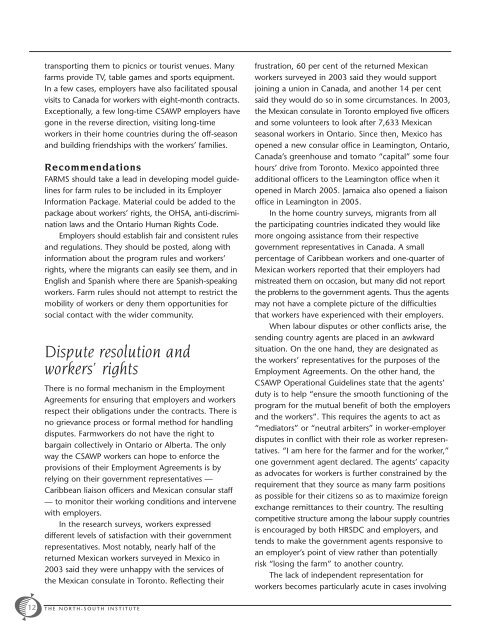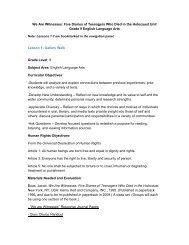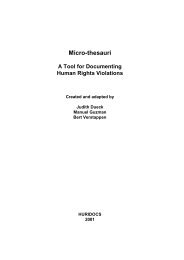Migrant Workers Canada
Migrant Workers in Canada - The North-South Institute
Migrant Workers in Canada - The North-South Institute
- No tags were found...
You also want an ePaper? Increase the reach of your titles
YUMPU automatically turns print PDFs into web optimized ePapers that Google loves.
transporting them to picnics or tourist venues. Many<br />
farms provide TV, table games and sports equipment.<br />
In a few cases, employers have also facilitated spousal<br />
visits to <strong>Canada</strong> for workers with eight-month contracts.<br />
Exceptionally, a few long-time CSAWP employers have<br />
gone in the reverse direction, visiting long-time<br />
workers in their home countries during the off-season<br />
and building friendships with the workers’ families.<br />
Recommendations<br />
FARMS should take a lead in developing model guidelines<br />
for farm rules to be included in its Employer<br />
Information Package. Material could be added to the<br />
package about workers’ rights, the OHSA, anti-discrimination<br />
laws and the Ontario Human Rights Code.<br />
Employers should establish fair and consistent rules<br />
and regulations. They should be posted, along with<br />
information about the program rules and workers’<br />
rights, where the migrants can easily see them, and in<br />
English and Spanish where there are Spanish-speaking<br />
workers. Farm rules should not attempt to restrict the<br />
mobility of workers or deny them opportunities for<br />
social contact with the wider community.<br />
Dispute resolution and<br />
workers’ rights<br />
There is no formal mechanism in the Employment<br />
Agreements for ensuring that employers and workers<br />
respect their obligations under the contracts. There is<br />
no grievance process or formal method for handling<br />
disputes. Farmworkers do not have the right to<br />
bargain collectively in Ontario or Alberta. The only<br />
way the CSAWP workers can hope to enforce the<br />
provisions of their Employment Agreements is by<br />
relying on their government representatives —<br />
Caribbean liaison officers and Mexican consular staff<br />
— to monitor their working conditions and intervene<br />
with employers.<br />
In the research surveys, workers expressed<br />
different levels of satisfaction with their government<br />
representatives. Most notably, nearly half of the<br />
returned Mexican workers surveyed in Mexico in<br />
2003 said they were unhappy with the services of<br />
the Mexican consulate in Toronto. Reflecting their<br />
frustration, 60 per cent of the returned Mexican<br />
workers surveyed in 2003 said they would support<br />
joining a union in <strong>Canada</strong>, and another 14 per cent<br />
said they would do so in some circumstances. In 2003,<br />
the Mexican consulate in Toronto employed five officers<br />
and some volunteers to look after 7,633 Mexican<br />
seasonal workers in Ontario. Since then, Mexico has<br />
opened a new consular office in Leamington, Ontario,<br />
<strong>Canada</strong>’s greenhouse and tomato “capital” some four<br />
hours’ drive from Toronto. Mexico appointed three<br />
additional officers to the Leamington office when it<br />
opened in March 2005. Jamaica also opened a liaison<br />
office in Leamington in 2005.<br />
In the home country surveys, migrants from all<br />
the participating countries indicated they would like<br />
more ongoing assistance from their respective<br />
government representatives in <strong>Canada</strong>. A small<br />
percentage of Caribbean workers and one-quarter of<br />
Mexican workers reported that their employers had<br />
mistreated them on occasion, but many did not report<br />
the problems to the government agents. Thus the agents<br />
may not have a complete picture of the difficulties<br />
that workers have experienced with their employers.<br />
When labour disputes or other conflicts arise, the<br />
sending country agents are placed in an awkward<br />
situation. On the one hand, they are designated as<br />
the workers’ representatives for the purposes of the<br />
Employment Agreements. On the other hand, the<br />
CSAWP Operational Guidelines state that the agents’<br />
duty is to help “ensure the smooth functioning of the<br />
program for the mutual benefit of both the employers<br />
and the workers”. This requires the agents to act as<br />
“mediators” or “neutral arbiters” in worker-employer<br />
disputes in conflict with their role as worker representatives.<br />
“I am here for the farmer and for the worker,”<br />
one government agent declared. The agents’ capacity<br />
as advocates for workers is further constrained by the<br />
requirement that they source as many farm positions<br />
as possible for their citizens so as to maximize foreign<br />
exchange remittances to their country. The resulting<br />
competitive structure among the labour supply countries<br />
is encouraged by both HRSDC and employers, and<br />
tends to make the government agents responsive to<br />
an employer’s point of view rather than potentially<br />
risk “losing the farm” to another country.<br />
The lack of independent representation for<br />
workers becomes particularly acute in cases involving<br />
12 THE NORTH-SOUTH INSTITUTE





